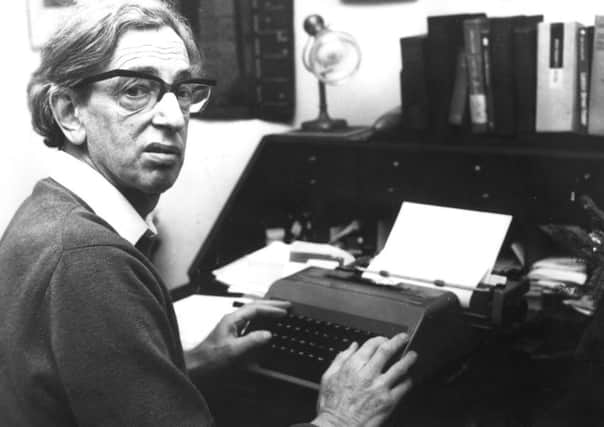Book review: Eric Hobsbawm: A Life in History, by Richard J Evans


Hobsbawm was born in Egypt, but a British citizen, his Jewish grandfather an immigrant, his father born in Whitechapel. His mother was Austrian and he spent his early childhood in Vienna and Berlin. His first language was German and he wrote poetry and kept his diary in German, even during the war, when he served in the British Army. As a schoolboy in Berlin in the early 1930s, horrified by the rise of Hitler and reading Marx, he became a Communist. He would remain one, if latterly a semi-detached one. The family moved to England. He completed his schooling in London and then went to King’s College, Cambridge. He was a brilliant student and was elected to the intellectual society called “the Apostles.” He travelled widely in western Europe, became fluent in French and Spanish, later in Italian too. He was both British and European; also a Communist. Membership of the party contributed to his undistinguished war. MI5 kept a file on him. Richard J Evans has had access to it. What he quotes from MI5 reports suggests that the spooks were wasting their time.
Hobsbawm would remain a Communist, though the party found him an unsatisfactory member. He was too independent-minded and he didn’t sell the Daily Worker at street-corners. He believed that his Communism cost him a lectureship at Cambridge. Perhaps it did, though there were Communist dons at both Cambridge and Oxford such as Maurice Dobb and Christopher Hill. He wasn’t a Stalinist and immediately, unlike the Party, accepted the truth of Khruschev’s denunciation of Stalin. But he stayed with the party even after the Soviets crushed the Hungarian Rising in 1956 and even late in life, when asked whether the Gulag and the Purges would have been justified if the promise of a just Socialist Society had been achieved, replied, with only a little hesitation, in the affirmative.
Advertisement
Hide AdAdvertisement
Hide AdMany found this appalling. Perhaps it is. On the other hand every society is built on the death of men, and the Right as well as the Left is guilty of accepting that circumstances determine whether the end justifies the means. For Hobsbawm the Soviet Union’s role in the defeat of Nazi Germany cemented his loyalty.That said, one fierce American Cold Warrior remarked that if Hobsbawm had been a Soviet citizen he would either have been “in a lunatic asylum repenting his deviations or seeking an exit visa to Israel.” None of his books was ever published in the Soviet Union.
Was he a great historian? The quartet Age of Revolution, Age of Capital, Age of Empire and Age of Extremes which made his popular reputation are wonderfully readable, intelligent, informative and thought-provoking. Experts can pick holes in them, but this is true of all attempts at wide-ranging historical surveys such as Arnold Toynbee’s once-famous magnum opus A Study of History. Neal Ascherson, a friend of Hobsbawm since he was his student at King’s, wrote, in a review of Age of Extremes, that “no historian now writing in English can match his overwhelming command of act and source,” and spoke of his “gift for startling, often seductive generalizations.” In short, whatever else he was, he was in his old age a charmer.
Evans is a friend of Hobsbawm as well as a biographer, and he has given what at this stage anyway must be the fullest account of an extraordinarily rich and varied life. His book is very long and very detailed, affectionate but not always uncritical. Too long perhaps, but it is good to have such a full and generous biography of a man who was constantly aware that he lived in interesting, if fractured, times. The biography too is, quite rightly, written for the general reader, though I doubt if anyone sufficiently interested in Hobsbawm and history needs to have Keynes identified as an economist.
Eric Hobsbawm: A Life in History, by Richard J Evans, Little, Brown, 743pp, £16.99